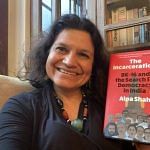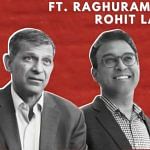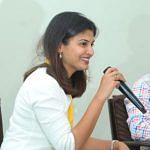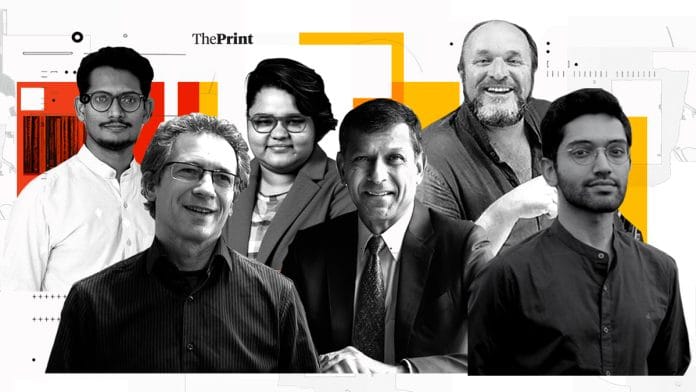In 2024, they unravelled myths about Gujarat model, uncovered the stars behind Hindutva pop, revived forgotten histories, and reshaped narratives on caste, religion, and governance. Put together by ThePrint’s distinguished jurors, here’s the list of non-fiction Indian authors who shaped public debate this year.
Jurors:
ThePrint’s panel of jurors included historian William Dalrymple, political scientist Ashutosh Varshney, author Shinie Anthony, public historian Anirudh Kanisetti, and publishers Chiki Sarkar, Arpita Das, and Karthika VK.
Members of the jury picked the names individually and in complete secrecy.
 Alpa Shah, The Incarcerations
Alpa Shah, The Incarcerations
Through meticulous research, Shah has compiled the first account of the Bhima Koregaon case. Particularly important is her detailed description of the ways in which the activists’ computers were hacked. Her clear-eyed examination of the case has become central to conversations on democracy and state overreach in recent years.
 Anirudh Kanisetti, Lords of the Deccan
Anirudh Kanisetti, Lords of the Deccan
Kanisetti has changed the entire conversation on the history of medieval South India. History in India has been obsessed with foreign invasions and the happenings of the Gangetic plains. Kanisetti’s Lords of the Deccan changed this, shining light on the political intrigue, religious struggles, and courtly rituals of the early medieval Deccan.
 Aparna Vaidik, Revolutionaries on Trial
Aparna Vaidik, Revolutionaries on Trial
One of the smartest historians of our time, Vaidik, through her work, offers a fascinating journey into the archive around the Lahore Conspiracy Case—and then out of it. Through a jigsaw puzzle of a narrative, she questions whether it is possible to write a history of nationalism without the moral judgement that accompanies acts of spying and perfidy.
 Arundhathi Subramaniam, Wild Women
Arundhathi Subramaniam, Wild Women
Subramaniam has dug deep into the past to revive the women mystics, saints, and goddesses of yore. With beautifully written biographies and the aptest verse examples, she reveals their feral sensuality and searing questions about the custodians of gender and faith. Her work invites us to question the historical portrayal of women in the histories of religion and spirituality as meek supporters.
 Ashok Gopal, A Part Apart
Ashok Gopal, A Part Apart
Gopal has been studying the life and thought of BR Ambedkar since 2004, so his immersion in all things Ambedkar is palpable in A Part Apart. He doesn’t deify Ambedkar but shows his internal intellectual journey—how he evolved, navigated Congress politics, and kept upgrading his arguments. This is a book we were all waiting for.
 Christophe Jaffrelot, Gujarat Under Modi
Christophe Jaffrelot, Gujarat Under Modi
Jaffrelot offers an in-depth assessment of politics and governance in Gujarat, debunking myths and speaking truth to power fearlessly. His book shows how Modi’s Gujarat served as a blueprint for Modi’s India, not only in terms of Hindu majoritarianism and national populism but also caste and class politics.
 Janaki Bakhle, Savarkar and the Making of Hindutva
Janaki Bakhle, Savarkar and the Making of Hindutva
Relying on a whole range of unexplored writings, especially those in Marathi, Bakhle delves deeply into the anti-Muslim and anti-caste pillars of Savarkar’s worldview. Her work shows that Hindutva is as much about the aesthetic experiences attached to the idea of India itself as it is a militant political programme.
 K Vaishali, Homeless
K Vaishali, Homeless
A voice like no other, Vaishali has imbued her memoir with unflinching honesty about a deeply intersectional life experience. It’s no surprise that it won the Sahitya Akademi Yuva Puraskar for English. By narrating her anxieties around reading and writing, Vaishali has voiced the lived reality of many young people in India.
 Karthik Muralidharan, Accelerating India’s Development
Karthik Muralidharan, Accelerating India’s Development
Muralidharan seeks to bridge the gap between scholarly research, public understanding, and actionable governance. His book argues that building more effective states and delivering public services is the most important task for India’s economic transformation. Drawing from a wealth of research and practical insights, he offers strategies for state-level reforms that are critical for India’s advancement.
 Kunal Purohit, H-Pop
Kunal Purohit, H-Pop
Purohit offers a frighteningly real corrective in his debut book, H-Pop: The Secretive World of Hindutva Pop Stars. It can be easy to forget how Hindutva is changing popular culture in rural India, sometimes in disturbing and violent ways, garbed in song and dance. By profiling the stars of Hindutva pop, Purohit uncovers the driving force behind these creators—and the motivations of their audience.
 Manu Pillai, Gods, Guns and Missionaries
Manu Pillai, Gods, Guns and Missionaries
Pillai is now, with Gods, Guns and Missionaries, unquestionably one of India’s most accomplished and impressively wide-ranging historians. With this latest work, he complicates popular narratives of the evolution of Hinduism and Hindu nationalism. The modern Hindu identity, he argues, is rooted in the Hindu pushback against the British Raj’s Christian conversion project.
 Neha Dixit, The Many Lives of Syeda X
Neha Dixit, The Many Lives of Syeda X
Dixit has written the best-reported book on the informal economy and India’s urban poor since Katherine Boo’s Behind the Beautiful Forevers and Aman Sethi’s A Free Man. Distilled from a decade’s worth of research, Dixit has cross-stitched a narrative examining gender, caste, and class with deep empathy in The Many Lives of Syeda X.
 Raghuram Rajan and Rohit Lamba, Breaking the Mould
Raghuram Rajan and Rohit Lamba, Breaking the Mould
Rajan and Lamba argue that the traditional path of development—from agriculture to low-skilled manufacturing to services—isn’t the right way for India’s future. Given new technological advancements and international trade realities, they emphasise the need to prioritise services. With their lucid and candid writing, the economists have sparked a widespread debate on the government’s policies.
 Sara Rai, Raw Umber
Sara Rai, Raw Umber
Rai’s autobiographical essays are written with great tenderness and touching honesty. By writing about her family members, many of whom were prominent literary figures, including her grandfather Premchand, Rai offers a window into a lost time. It is perhaps fitting that her memoir examines memory itself—its nature, its origin, and its relationship with literature.
 Sohini Chattopadhyay, The Day I Became a Runner
Sohini Chattopadhyay, The Day I Became a Runner
Chattopadhyay argues that women runners pose a more direct challenge to patriarchy than women tennis or cricket players. Her account, in equal parts gritty, inspiring, and sobering, brings the lives (and worlds) of eight extraordinary women to life. She has, in a way, compiled a history of Indian women.
 William Dalrymple, The Golden Road
William Dalrymple, The Golden Road
Not only did Dalrymple start the conversation around academic and popular history writing in 2024, but he also wrote the first book arguing that India was much more central to the Silk Road than China. The ancient India he brings to life in The Golden Road is no aloof, civilising power. It is instead constantly open to learning from the world—as much as teaching it.
 Yashaswini Chandra, The Tale of the Horse
Yashaswini Chandra, The Tale of the Horse
Chandra has extended history’s inquiry into the animal kingdom, galloping straight into the premier division of Indian non-fiction writers. She doesn’t tie the story of horses to aristocracy alone but connects it with the many migrations in Indian history. In the horse, Chandra has the perfect vantage point to document the evolution of social life, religion, sport, and warfare in India.






